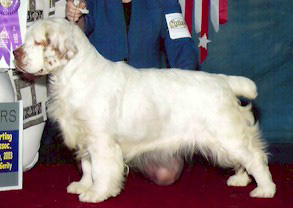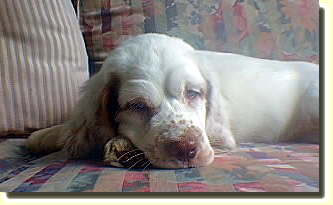
Clumber Spaniel
Group: Sporting Group
Origin: Great Britain
Height:
- – Males: 18 to 20 inches at the withers
– Females: 17 to 19 inches at the withers.
Weight:
- – Males: 70 to 85 lbs (31-38.6 kg)
– Females: 55 to 70lbs (25-31 kg).

Can/Am Ch. Mason’s Song of the South, aka “Dixie”
Photo: Mason Kennels
CLICK HERE to View Breeder Listings
Breed Profile
The Clumber Spaniel is thought to have come from a mixing of the Basset Hound with an early European spaniel, the now extinct Alpine Spaniel. The name comes from Clumber Park in Nottinghamshire. Although not the fastest of the Spaniels, the Clumber is a sturdy dog with excellent trailing, flushing and retrieving abilities, and was valued for his ability to work in dense undergrowth and as a game finder.
The Clumber is a loyal and affectionate dog. His thoughtful and kind expression give him an appearance of dignity but he is also enthusiastic about work and play. He can be reserved but never hostile or timid. The Clumber is a strong, muscular and powerful dog who may appear heavy and slow; however, he is neither slow in movement or thought. Overall, the Clumber is a faithful companion, kind, loving, always eager to please, loves children and generally gets along well with other dogs.
He has a medium-length coat that is straight, silky and dense with well feathered legs and chest. He is predominantly white with lemon or orange markings. He may have markings around one eye, both eyes or a completely white face and freckles on the muzzle, forelegs and ears are also common.
Health Issues
The Clumber Spaniel breed, like all breeds, have some health problems, including:
- Hip Dysplasia
- Hypothyroidism — This appears to be on the increase but can be treated effectively.
- Eye problems are another issue, mainly Entropion and Ectropion.
If you are considering the adoption of a Clumber Spaniel puppy, or any breed, it is very important to be selective in choosing a responsible and reputable breeder. Ensure that the prospective puppy’s parents have all health clearances. Breeding of any dog should not be done until after they have been proven to be free of evidence of significant hereditary diseases. (For more information on selecting a breeder, see the articles on the General Information page.)
Recommended Health Screening:
For the Clumber Spaniel, the CHICNote 1 database includes health screenings for:
- Hip Dysplasia
- Elbow Dysplasia
- Eye Examination by a board Ophthalmologist
- Pyruvate DehydroGenase Phosphatase 1 (PDP1)
Additional Health Resources:
- Health and Nutrition — Growing section of the Canada’s Guide to Dogs website which includes information on several health and nutrition related issues.
- Canine Health Information Center (CHIC) — Providing a source of health information for owners, breeders, and scientists that will assist in breeding healthy dogs. CHIC is a centralized canine health database jointly sponsored by the AKC/Canine Health Foundation (AKC/CHF) and the Orthopedic Foundation for Animals (OFA).
- AKC Canine Health Foundation — Working towards developing scientific advances in canine health.
- OFA – Companion Animal Eye Registry (CAER)
- Orthopedic Foundation for Animals (OFA)
- Ontario Veterinary College (OVC)
- University of Pennsylvania Hip Improvement Program (PennHip)
- HealthGene — HealthGene Corporation is the leading provider of veterinary DNA diagnostic services in Canada.
- Labgenvet — Laboratory of Veterinary Genetics is a Canadian diagnostic laboratory that offers a comprehensive service of DNA tests for veterinary genetic diseases.
Grooming Information
- Grooming — This section of the Canada’s Guide to Dogs website includes tips, articles and information covering all aspects of dog grooming along with a listing of Groomers from across Canada.

Can/Am Ch. Mason’s Song of the South, aka “Dixie”
Photo: Mason Kennels
Training Resources
- Training — For training information, see this growing section of the Canada’s Guide to Dogs website for tips, articles, as well as listings of training centres across Canada.
Additional Information
- Clubs, Sports & Activities — For information on the many sports and activities you can get involved in with your dog.
- Working Dogs — The Working Dogs section of the Canada’s Guide to Dogs website provides information and listings of organizations that are involved in various dog jobs, such as Guide Dogs, Therapy Dogs, Police Dogs, Protection Dogs, and much more.
*NOTE 1: CHIC – The Canine Health Information Center “is a database of consolidated health screening results from multiple sources. Co-sponsored by the Orthopedic Foundation for Animals (OFA) and the American Kennel Club (AKC) Canine Health Foundation, CHIC works with parent clubs to identify health screening protocols appropriate for individual breeds. Dogs tested in accordance with the parent club established requirements, that have their results registered and made available in the public domain are issued CHIC numbers.” To learn more, visit: www.caninehealthinfo.org
*NOTE 2: The Fédération Cynologique International (FCI) is the World Canine Organization, which includes 91 members and contract partners (one member per country) that each issue their own pedigrees and train their own judges. The FCI recognizes 344 breeds, with each being the “property” of a specific country. The “owner” countries write the standards of these breeds in co-operation with the Standards and Scientific Commissions of the FCI, and the translation and updating are carried out by the FCI. The FCI is not a breed registry nor does it issue pedigrees.
Breed Listing
Quick Links
Get In Touch
- Email: canadasguidetodogs@gmail.com
- Email: info@canadasguidetodogs.com
- Visit us on Facebook: www.facebook.com/CanadasGuideToDogs
— CanadasGuideToDogs.com is an Amazon Associate as well as a participant in various affiliate programs, as such fees are earned from qualifying purchases.
